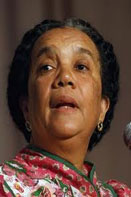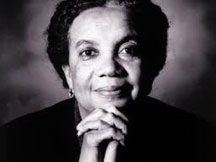

Child Watch
Inspiring Lessons from Ruby Bridges: A True American heroine
By Marian Wright Edelman
As a six-year-old first grader in New Orleans in 1960, Ruby Bridges became the first Black student to attend an all-white elementary school in the South. She showed unforgettable loving, forgiveness and courage when faced with the ugly screaming white mobs who jeered and taunted her every day as she walked into William Frantz Elementary School. Federal marshals had to escort Ruby to school, but she never quit or turned back. Ruby astonished her teacher one day when she asked Ruby why she had paused and talked to the crowd of white adults that morning, and Ruby responded, “I wasn’t talking. I was praying. I was praying for them.”
Today she is the founder of the Ruby Bridges Foundation (RBF), which seeks to end racism and prejudice and promote tolerance, respect, and appreciation for all differences. Her message comes at a moment when equal access to a quality and equitable education is receding and remains an urgent need and the unfinished business of the Civil Rights Movement and the nation. As three new studies released in September by UCLA’s Civil Rights Project show, American schools are rapidly re-segregating by race and income, and 80 percent of Latino students and 75 percent of Black students attend majority nonwhite schools.
So often poor, majority minority schools have fewer resources and less experienced teachers. And at the same time that children of color are expected to become a majority of our child population by 2019, the U.S. Supreme Court is hearing another case challenging affirmative action in higher education.
The country must wake up and stop the backwards slide in fair treatment for poor children and those of color. When Ruby Bridges spoke at the Children’s Defense Fund’s recent national conference, she took us back to that first year at William Frantz and the key lessons she learned that have shaped her life. Ruby explained that her parents had seized on the opportunity to let her attend William Frantz because they understood it would ultimately lead to a better education, but on her first day of school she was unaware she was making history: “The truth of the matter is at six years old I knew absolutely nothing about what was going on . . . The only thing that I was ever told is that I was going to attend a new school today, and, ‘Ruby, you better behave!’” The chaos outside her New Orleans school reminded her of Mardi Gras, and at first she thought she was part of a parade. Eventually it became clear that the white adults who surrounded her were saying and doing hateful things. But then she met Barbara Henry, the white schoolteacher from Boston who was assigned to teach her all alone after other teachers refused to teach a Black child. Her kindness set an unforgettable example: “You cannot look at a person and tell whether they’re good or bad. Evil comes in all shades and colors. That is the lesson that I learned from the teacher that looked exactly like the people outside that threw things, spat, and yelled—she looked exactly like them, but she was different, and I knew that at six years old, because she showed me her heart.”
Learning that you can never judge anyone from the outside was the first lesson of that tumultuous year. A second was that we must all “become brothers and sisters:” “We must absolutely take care of one another. It does take a village, but we have to be a village first. We have to take care of each other’s children.” She remembered some of the other adults in her neighborhood who did this for her: “I was escorted every day by Federal marshals, but everyone on my street walked behind the car every day . . . I would pass [the windows of a dry cleaners’ shop] every day, and all the men that worked in the dry cleaners would wave and say, ‘How are you doing today? You do good in school.’ So when I got my report card, I would stand by those windows . . . and they would see it and they would hand me dollar bills . . . That’s a community, and that’s what we need again.”
As an adult, Bridges has taken her own commitment to being part of that community for the next generation of children very seriously. She returned to William Frantz Elementary as a volunteer and parent community liaison and has been deeply involved in the fight to have the school restored after it was badly damaged by Hurricane Katrina. Her ultimate goal is for the rebuilt school to become a model for integration and equity in education and teaching children accurate history, including stories like her own: “If you really think about it, if we begin to teach history exactly the way that it happened, good, bad, ugly, no matter what, I believe that we’re going to find that we are closer, more connected than we are apart . . . I was told that, ‘Ruby, your vision is a grandiose plan,’ and what I said to that is, ‘Well, it was a grandiose plan when you marched my little butt up those stairs back in 1960, but it happened.’”
Bridges is an inspiring reminder that our nation owes a huge debt of gratitude not just to the adults who took a stand during the Civil Rights Movement but to the extraordinary children and youths who were frontline soldiers in the war to overthrow Jim Crow in American life. Children and young people taught us to be courageous and to stand up against injustice and to do so with uncommon dignity, maturity, nonviolence, and grace that was often a direct contrast to the hate-filled adults around them. At the same time, those children needed to know they had parents, teachers, and other caring community members who supported and stood behind them. The adults who stood up and supported Bridges left a lasting impression that has shaped her entire life, and her message to all of us is that each of us adults needs to be that light for children today. This is especially true for the millions of poor Black and Latino children who are still fighting for their right to a better education more than 50 years after Bridges’ brave actions.




Be the first to comment